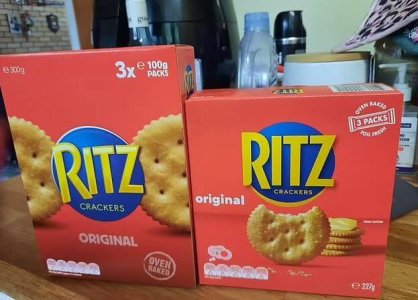Coles shoppers shocked by this 'infuriating' detail in new RITZ cracker boxes
- Replies 15
We all have our favourite snacks, especially when they come in a handy package that you can easily munch on while watching TV, reading a book or simply taking a break in the middle of a busy day. That's why it can be frustrating when changes to our beloved snacks come along.
This is what shoppers at a local supermarket recently called attention to after they saw an 'infuriating' detail in the new RITZ cracker boxes.
One particular customer was furious after noticing a subtle change to RITZ cracker boxes during their weekly shop at Coles.
Taking to the popular social media site Twitter, the shopper compared the size of two boxes: one was an older box with 300g of product inside, and a newer box consisting of 227g worth of product.
And although both boxes contain three packets of crackers, the newer RITZ cracker box was much smaller and allegedly cost more than the original.
‘Coles – smaller packet, bigger price tag! WTF!’ The shopper wrote in her post and attached a photo for comparison.
‘Greed, not inflation,’ she added.
However, the woman’s claim cannot be confirmed since there was no price included in her post, so it remains unclear whether the price has increased.
In a similar instance, another shopper noticed the size difference and shared a similar photo to a popular Facebook group dedicated to cooking.
‘Shrinkage factor. 300g down to 227g,’ the woman revealed. When a product is downsized, but its price stays the same, the practice is referred to as shrinkflation. You can read more details about this phenomenon here.
Other Facebook users joined the conversation and stated how they also couldn’t believe the price.
One said: ‘Do they really think we won’t notice?’ While another wrote that they also saw prices going up while quantities went ‘down’.
‘Noticed this too and wasn't impressed…at the end of the day, the customer is unhappy, so not sure about the marketing tactic used here,’ someone else replied.
The comments section was closed down by Coles’ administration not long after the post was made. Coles has yet to comment on this matter.
A spokesperson from Mondelez, the parent company of RITZ crackers, told reporters that external factors were to blame for the changes to the product.
‘Due to the rising costs that many manufacturers are facing, we have made the difficult decision to adjust the recommended size of RITZ Original and Cracked Pepper,’ the spokesperson shared, before adding that this way ensures the company can still deliver the ‘highest quality crackers’ for their customers.
‘We know this will disappoint some, however, we’re committed to providing Australians with the same high-quality and great tasting RITZ Crackers. The last few years have been extremely challenging for food manufacturers, and like many, we have experienced significant supply chain challenges and absorbed rising commodity and input costs,’ they shared.
The spokesperson revealed that although they try to hold product weights for ‘as long as they can’, they also said it was necessary to make adjustments sometimes. They continued: ‘[This is] to ensure we can continue to manufacture our snacks sustainably in this environment.’
More instances of shrinkflation have emerged online. A man took to the popular social media forum Reddit and shared a photo of a slice of wholemeal bread that fits in the palm of his hand.
‘Woke up with massive hands…or Coles bakery bread is shrinking?’ He wrote in his post and attached a photo as proof.
‘Why are Woolies and Coles raising prices by 20+% when it’s only actually a couple of per cent? Actual inflation-adjusted prices should be 5-10¢ more on items under $5. These companies are absolutely f*****g us over, and we should be angry and protesting,’ one commented.
‘Is this what shrinkflation is? Genuinely curious.’ Another remarked.
A spokesperson for Coles clarified that the in-store bakery bread has ‘not reduced in size’.
However, shrinkflation is real in some instances, and it’s a term that’s becoming too familiar for many Aussies grappling with the cost-of-living crisis.
Professor Vinh Thai from RMIT University explained that shrinkflation is something consumers have witnessed in events that lead to increased costs for manufacturers. COVID-19 and the succeeding events of recent years, including supply chain disruptions, fuel price hikes, and labour shortages in the country, have caused prices to rise.
And while the backlog in the supply chain has stabilised and decreased, the cost impact remains.
‘When costs increase like that, companies need to think of ways to minimise the impact. So, if the costs increase and if they [manufacturers] want to maintain the same profit margin, then the selling price will need to go up, especially for commodities like food and groceries,’ the professor explained before adding that if manufacturers want to avoid selling higher-priced goods, then the volume and quantity of the product must be reduced.
The downside for manufacturers is the risk of losing customers, who would now be paying more for less.
‘Statistically, customers look for other options when faced with shrinkflation. They may or may not come back to that particular brand,’ Professor Thai stated.
 Have you ever been tricked by shrinkflation? Tell us about it in the comments below!
Have you ever been tricked by shrinkflation? Tell us about it in the comments below!
This is what shoppers at a local supermarket recently called attention to after they saw an 'infuriating' detail in the new RITZ cracker boxes.
One particular customer was furious after noticing a subtle change to RITZ cracker boxes during their weekly shop at Coles.
Taking to the popular social media site Twitter, the shopper compared the size of two boxes: one was an older box with 300g of product inside, and a newer box consisting of 227g worth of product.
And although both boxes contain three packets of crackers, the newer RITZ cracker box was much smaller and allegedly cost more than the original.
‘Coles – smaller packet, bigger price tag! WTF!’ The shopper wrote in her post and attached a photo for comparison.
‘Greed, not inflation,’ she added.
However, the woman’s claim cannot be confirmed since there was no price included in her post, so it remains unclear whether the price has increased.
In a similar instance, another shopper noticed the size difference and shared a similar photo to a popular Facebook group dedicated to cooking.
‘Shrinkage factor. 300g down to 227g,’ the woman revealed. When a product is downsized, but its price stays the same, the practice is referred to as shrinkflation. You can read more details about this phenomenon here.
Other Facebook users joined the conversation and stated how they also couldn’t believe the price.
One said: ‘Do they really think we won’t notice?’ While another wrote that they also saw prices going up while quantities went ‘down’.
‘Noticed this too and wasn't impressed…at the end of the day, the customer is unhappy, so not sure about the marketing tactic used here,’ someone else replied.
The comments section was closed down by Coles’ administration not long after the post was made. Coles has yet to comment on this matter.
A spokesperson from Mondelez, the parent company of RITZ crackers, told reporters that external factors were to blame for the changes to the product.
‘Due to the rising costs that many manufacturers are facing, we have made the difficult decision to adjust the recommended size of RITZ Original and Cracked Pepper,’ the spokesperson shared, before adding that this way ensures the company can still deliver the ‘highest quality crackers’ for their customers.
‘We know this will disappoint some, however, we’re committed to providing Australians with the same high-quality and great tasting RITZ Crackers. The last few years have been extremely challenging for food manufacturers, and like many, we have experienced significant supply chain challenges and absorbed rising commodity and input costs,’ they shared.
The spokesperson revealed that although they try to hold product weights for ‘as long as they can’, they also said it was necessary to make adjustments sometimes. They continued: ‘[This is] to ensure we can continue to manufacture our snacks sustainably in this environment.’
More instances of shrinkflation have emerged online. A man took to the popular social media forum Reddit and shared a photo of a slice of wholemeal bread that fits in the palm of his hand.
‘Woke up with massive hands…or Coles bakery bread is shrinking?’ He wrote in his post and attached a photo as proof.
‘Why are Woolies and Coles raising prices by 20+% when it’s only actually a couple of per cent? Actual inflation-adjusted prices should be 5-10¢ more on items under $5. These companies are absolutely f*****g us over, and we should be angry and protesting,’ one commented.
‘Is this what shrinkflation is? Genuinely curious.’ Another remarked.
A spokesperson for Coles clarified that the in-store bakery bread has ‘not reduced in size’.
However, shrinkflation is real in some instances, and it’s a term that’s becoming too familiar for many Aussies grappling with the cost-of-living crisis.
Professor Vinh Thai from RMIT University explained that shrinkflation is something consumers have witnessed in events that lead to increased costs for manufacturers. COVID-19 and the succeeding events of recent years, including supply chain disruptions, fuel price hikes, and labour shortages in the country, have caused prices to rise.
And while the backlog in the supply chain has stabilised and decreased, the cost impact remains.
‘When costs increase like that, companies need to think of ways to minimise the impact. So, if the costs increase and if they [manufacturers] want to maintain the same profit margin, then the selling price will need to go up, especially for commodities like food and groceries,’ the professor explained before adding that if manufacturers want to avoid selling higher-priced goods, then the volume and quantity of the product must be reduced.
The downside for manufacturers is the risk of losing customers, who would now be paying more for less.
‘Statistically, customers look for other options when faced with shrinkflation. They may or may not come back to that particular brand,’ Professor Thai stated.
Key Takeaways
- Coles supermarket has been called out by shoppers over an 'infuriating' detail in its new Ritz cracker boxes.
- One shopper on Twitter posted a picture showing two boxes of Ritz crackers – one older box, which was 300g, and a newer box, which was 227g.
- Both boxes contain three packets of crackers, but one box appears much smaller and apparently costs more than the original.
- A spokesperson from Mondelez, the company that makes Ritz crackers, said that external factors were to blame for the changes to the product.










